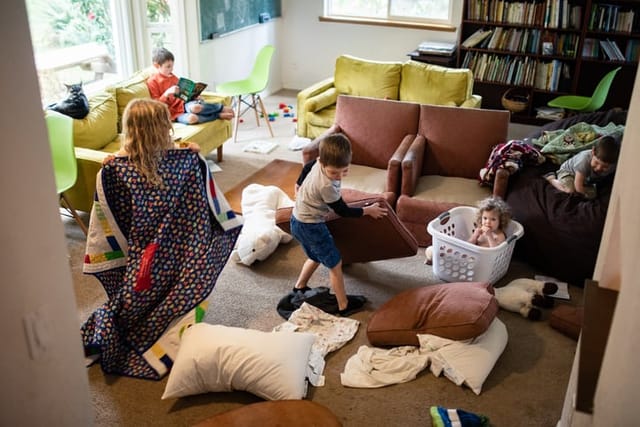Raising my son has been one of the most beautiful yet refining roles of my life. Motherhood holds a constant mirror to my every action—thoughts and intentions included. It’s no secret that we are an example to our children, but it’s up to us what kind. Undoubtedly, our children will mimic the people we are, so it’s important to be a strong leader for our kids. Here’s how to do it.
1. Be genuine when life is hard.

Strong leaders don’t prioritize facades. They don’t live to “show face” and “put up a front” for social media’s sake. That’s why it’s important to let your children know when life is hard. That might look like explaining that finances are tight for the month. Or it could mean explaining why you are grieving a broken friendship. We don’t give children their due credit—they can sense when something’s up. Lead them well by being honest about the hard stuff.
2. Don’t shy away from emotions.
Being honest isn’t always easy, and often, it requires lots of humility. Strong emotions are sure to follow, but this isn’t something to shy away from. If you are crying, let them see your tears. If you are angry, show them how to handle anger in a respectful, mature way. Your children will experience their own set of emotions, so they should see how to correctly process them from you.
3. Open the floor for tough conversations.
It can feel intimidating to have tough conversations with kids because, often, we don’t have answers for life’s hard moments. Have the conversations anyway. Remember that experience is on your side, so offer whatever wisdom you have. You want your children to know they can come to you with anything.
4. Leave room for questions.

Children are curious, and that curiosity will only grow as they do. The more of the world they see, the more questions they will have. Don’t shut down their curiosity. Welcome it.
5. Don’t idolize them.

This is a tough one for me, possibly the toughest. It’s easy to make my son my world and neglect my husband, even my own health. We can’t place people on pedestals, and that includes our children. They need to navigate life knowing they aren’t perfect and that there are lessons to be learned. Watch that your children don’t consume who you are.
6. Respect their other parent.

Whether you are in a loving relationship with your child’s other parent or things ended on bad terms, be the better person. Respect your child’s other parent. Leaders understand boundaries but won’t neglect basic respect for others. Your children will take note of this and use it as a foundation for how they navigate relationships.
7. Love others well.
This is about more than your child’s other parent. It’s about more than family. Lead your children toward love by how you treat the waitress, the older person slowing traffic, the dump truck driver—anybody and everybody you come in contact with. Smile at people. Look them in the eye. Speak kindly to them. You might not realize it, but your children watch your every move, even the seemingly small ones.
8. Rest.

Leaders know when to rest and recharge. Your children will need to see you practice this. If they don’t see you taking a breather, they will develop an unhealthy relationship with productivity. Today’s culture worships the go-getter and the person who can do all the things, but no one sees how drained these people are. Don’t let your children become slaves to checklists and accomplishments.
9. Watch your tongue.
This is another tough one for me. It’s easy to speak the first thing that comes to mind, especially to the person who cut me off at the red light. But remember that your children will not only mimic your actions but your words.
10. Ask for forgiveness.

When you do slip up with your words, or even actions, ask for forgiveness. This includes asking forgiveness when you’ve wronged your children. Adults get things wrong too and should apologize to anyone they’ve hurt.
11. Say, “I don’t know” when you don’t know.
This goes back to honesty. Whether you don’t know why the sky is blue or why you overreacted at the grocery store, don’t lie. Don’t ignore the conversation either. There’s a beautiful humility you show your kids when you honestly say, “I don’t know.”
12. Refuse to make excuses.

Children can sense when you’re making excuses, whether about why you won’t play with them or why you don’t like their friend. Excuses are a seemingly easy copout, but they never get to the root of any issues. However, these issues will crop up again, maybe in a different way, but they will be there nonetheless. Instead of making excuses, value your child enough to sit them down and explain things.
13. Prioritize community.
Teach your children the value of community. Let them be involved with a soup kitchen or clothes closet. Let them plug into a church group or a local community center. Encourage them to connect with others who can positively impact them and encourage them to love well.
14. Monitor the content you consume.

Let your children see your healthy relationship with content and social media devices. Don’t let your phone become more important than your children. Put that contraption down at the dinner table. Don’t let them see you bash other moms in your feed. In today’s world, it’s dire to monitor the content you consume and control how you respond to it. (Our children will always be more important than that ten-second reel.)
15. Know when to follow.
Your children need to know when to not only lead but follow — and they need to know how to decide who’s worth following. Let them see you take the back seat when someone else is better suited to lead. Your humility will ground your children and create level-headed, respectful adults.
Enjoyed this piece? Give us a like and follow Bolde on MSN for more!









